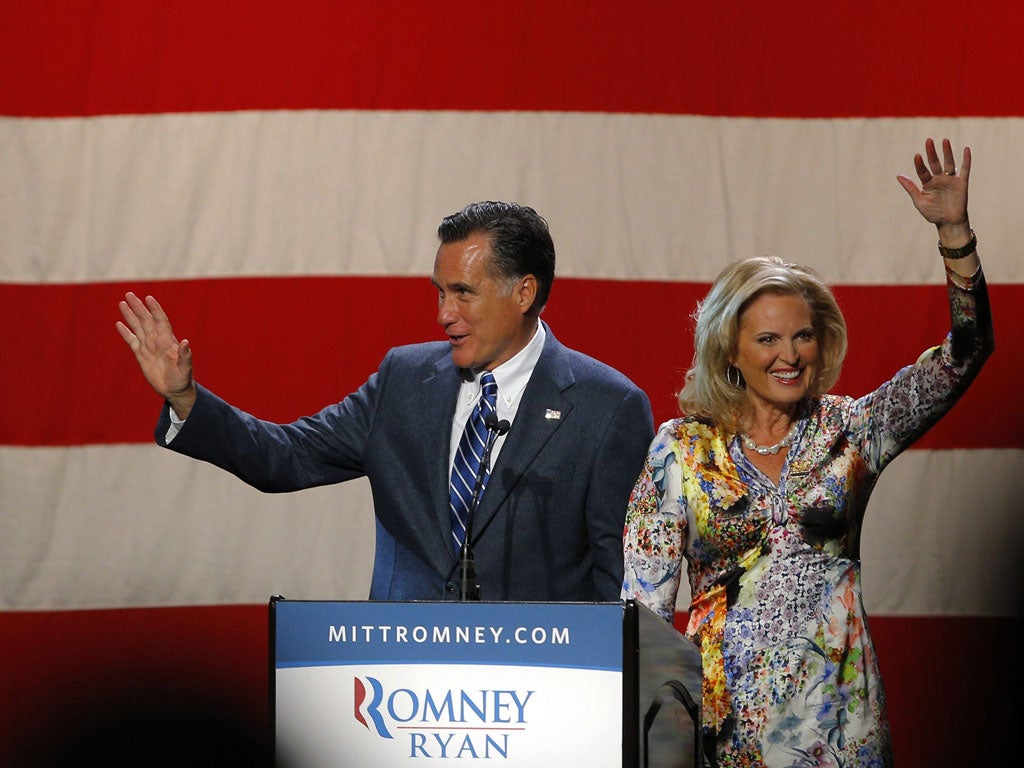Ann Romney: 'I'd be worried for his mental well-being'
In TV interview, candidate's wife admits her fears if he should win White House race

Your support helps us to tell the story
From reproductive rights to climate change to Big Tech, The Independent is on the ground when the story is developing. Whether it's investigating the financials of Elon Musk's pro-Trump PAC or producing our latest documentary, 'The A Word', which shines a light on the American women fighting for reproductive rights, we know how important it is to parse out the facts from the messaging.
At such a critical moment in US history, we need reporters on the ground. Your donation allows us to keep sending journalists to speak to both sides of the story.
The Independent is trusted by Americans across the entire political spectrum. And unlike many other quality news outlets, we choose not to lock Americans out of our reporting and analysis with paywalls. We believe quality journalism should be available to everyone, paid for by those who can afford it.
Your support makes all the difference.Ann Romney has told a television station that if her husband, the Republican presidential candidate Mitt Romney, wins the presidential election, her biggest concern would be his "mental well-being".
In an interview with Nevada's KTVN, Mrs Romney was asked what her biggest worry was should Mitt Romney be elected to serve in the White House. "I think my biggest concern obviously would just be for his mental well-being," she said. "I have all the confidence in the world in his ability, in his decisiveness, in his leadership skills, in his understanding of the economy. So for me, I think it would just be the emotional part of it."
Her remarks are the latest example of the disarming candour – or gaffes, as opponents call them – that has characterised the Romney campaign. In Iowa last week, Mrs Romney told those inside her husband's party who have been critical of his campaign: "Stop it. This is hard. You want to try it?"; and the candidate himself has supplied a rich crop, ranging from his now-notorious "47 per cent of the people will vote for the President no matter what", to his clumsy raising of the "birther" issue, and undiplomatic doubting of London's ability to run a good Olympics. And on Friday, in Pennsylvania, Mr Romney admitted that this former swing state would be difficult for him to win.
The major opportunity to turn things around – Mr Obama currently holds a 5 per cent lead nationally, with wider advantages in swing states – comes this Wednesday with the first of the presidential debates in Denver. The subject is domestic policy and the tepid US economy, Mr Romney's main campaign theme. He is now undergoing intense rehearsals with Ohio Republican Senator Rob Portman playing the role of Mr Obama. The preparation includes how to make sure Mr Romney does not come across as scolding, and avoids complaining about the debate rules – something he did several times during the presidential primary battle.
Alan Schroeder of Northeastern University in Boston, who has written a history of presidential debates, said: "They are pretty evenly matched as debaters. They both tend to be more intellectual than emotional, and they are both articulate and comfortable on camera. But they would both prefer to be in a more controlled setting."
Debates rarely make a big difference to the final results, but a strong performance can give a candidate a bump of a few percentage points, said Mitchell McKinney, a political communications specialist at the University of Missouri. "This is Romney's chance. Can he take advantage?" Recent presidential debates suggest the first debate could be Mr Obama's toughest. He will have to walk a fine line in acknowledging the nation's economic difficulties, while offering a more hopeful vision for the future.
Join our commenting forum
Join thought-provoking conversations, follow other Independent readers and see their replies
Comments